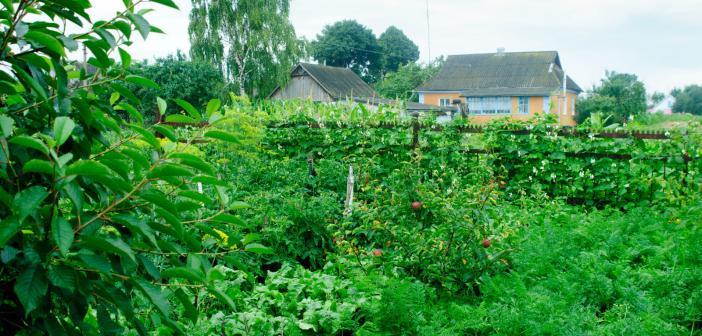In recent years, permaculture has influenced thousands of people to begin to search for more sustainable ways to live in harmony and community with the natural world and the community of people around them. More than just a simple collection of organic farming tools and methods, the permaculture movement rests on three main ethics that question the organization and logic of our industrial civilizational paradigm and help us to re-imagine a new, more sustainable way of living.
A Simple Definition of Permaculture
Permaculture has been defined in a variety of ways by different people. We offer four widely accepted “definitions” of permaculture that embody the purpose and vision behind this worldwide movement.
- Permaculture is the practice of designing sustainable human habitats by following nature’s patterns and respecting nature’s limits.
- Permaculture is focused on thoughtful design. This process of design is a system of assembling conceptual, material, and strategic components in a pattern, which functions to benefit life in all its forms. It seeks to provide a sustainable and secure place for all living things on this earth.
- Permaculture is the conscious design and maintenance of agriculturally productive systems which have the diversity, stability, and resilience of natural ecosystems.
- Permaculture empowers individuals to exist independently of larger systems that seek to abuse us and our resources.
The root of all permacultural actions stems from three main ethics:
- Care of the Earth
- Care of people
- Redistribution of surplus to the first two ethics
While these ethics may seem somewhat simple and basic, they offer an ethical ground from which permaculture design grows.

Ethic 1: Care of the Earth
Care of the earth means that we are called to work with nature and not against it. The biologist James Lovelock has written about the Gaia hypothesis which holds that the Earth itself is a self-regulating organism of which we and everything else are a part. If we take this to be true, then caring for the earth is synonymous with caring for ourselves because we are part of Gaia, the super organism that is our planet.
However, due to the fact that humanity, especially over the last 200 years since the dawn of the Industrial Revolution has vastly changed the functioning of earth’s ecosystems, care of the earth also implies a determined protection of natural systems. Because we’re cutting down rainforests to pasture beef for our fast food restaurants and draining wetlands to build more high rises for the super wealthy, these natural systems are losing their natural resiliency.
Our anthropocentric mindset mistakenly believes that the earth depends on us humans when in fact the earth could (and very well may) go on existing without if our species were to go extinct. Despite our dependence on the natural world, there are things that us humans can do to help recuperate vulnerable natural environments. Aiding in the rehabilitation of high potential degraded ecosystems through the process of permacultural design is an important part of this first ethic.
Permaculture also focuses on accelerating natural succession. Natural systems evolve over time to what is most fertile, healthy and holistic. For example, a piece of land that was bulldozed to nothing will slowly begin to cover the ground once again with pioneer species of plants which give way to bushes and scrub growth. In time seeds from certain plants may be brought into that piece of land by birds or other animals and saplings will begin to grow.
All the while the soil is regaining fertility from the diversity of species that are colonizing the area. Over many years’ time, the bulldozed landscape will eventually become a healthy forest through the process of ecological succession. Caring for the land means following from nature’s lead and helping to accelerate this natural succession through the selection of certain species, the protection of certain environments and other human promoted actions that stem from the observation of how natural systems work.
Ethic 2: People Care
Permaculture recognizes that human beings are a special part of any system. While we recognize with humility that we are simply a part of the larger functioning of Gaia, or the Earth as a super organism, we are indeed a special part. As the only species with a self-reflective consciousness, we constitute, in a sense, the ability of the Earth itself to reflect upon itself.
Caring for people means that we recognize the uniqueness of humanity and seek to help all people discover their full potential within the natural system where they live. Because of the vast disparities resulting from global inequality, people care may mean very different things in different areas.
For people suffering from immense poverty and misery in certain parts of the globe, people care may entail finding ways to help people overcome their poverty through economic growth. Where the sustainable lifestyles of indigenous populations are under threat from mega-mining and hydroelectric projects run by multinational corporations, people care may mean engaging in advocacy efforts to lend your voice to the voiceless. In cases where wealthier people have completely accepted the myth of consumer affluence and unlimited growth, people care may entail helping them to discover ways to live more sustainably and accept degrowth as their primary economic goal.
By pushing people to return their lives and livelihoods to actual, concrete places, permaculture also helps people to rediscover the importance of community. The current ordering of our society is somewhat nomadic. We have very little ties or connections to any real, tangible place on earth. Many of us may live in a neighborhood or apartment complex where we don’t know the names of our neighbors. We may work miles away from our homes at a company that does business on the other side of the world.
We buy our food from grocery stores where we have no idea where our food what produced, by whom or in what conditions. The distance between the producer and the consumer leads to an anonymity that we have come to take for granted, but that also can lead to unethical consumption. If we don’t know the effects of our consumption, how can it be ethical?
By returning our lives to real places, we also open up the ability to rediscover community. The best way to truly care for people is to place your life into a context where you can see how your actions will affect those around you. Though it is important to be aware of global needs and participate in advocacy and activism on behalf of those needs, people care also needs to be more immediate, tangible, and less abstract.
We care for that which we love, and we love that which is closest to us. We may feel the need to protect the Amazon Rainforest from destruction and may offer financial support to indigenous groups fighting the Belo Monte mega hydroelectric dam in the Amazon. However, unless we live in Brazil, it is difficult to feel the same connection and care for the Amazon as we feel for the small piece of forest that surrounds our houses where we go every weekend to hunt for mushrooms or to find the solace and nourishment that comes from walking through the mist of the early morning.
Similarly, we may feel the need to live in solidarity with the thousands of Syrian refugees who are fleeing the perils of war. We may want to understand the geopolitical realities that are leading to this migration and offer support and encourage just foreign policy. This is all good and necessary, but it does not replace the true community of neighbors sharing a real space.
The author, farmer and poet Wendell Berry says that “a community is the mental and spiritual condition of knowing that the place is shared and that the people who share the place define and limit the possibilities of each other’s lives. It is the knowledge that people have of each other, their concern for each other, their trust in each other, the freedom with which they come and go among themselves.” Discovering how to live in this definition of community is also an essential part of people care.

Ethic 3: Fair Share or Redistribution of Surplus
The third ethic of permaculture is in many ways the hardest to understand. The co-founder of permaculture, Bill Mollison, first defined the third ethic as self-control of consumption and growth. Many permaculture teachers today talk of the idea of “fair shares” because it rhymes nicely with the first two ethics.
The principle of redistribution of surplus, however, is how we define the third ethic of permaculture. Limiting growth and consumption is an important part for any sustainable system. Advocating for “fair shares” amongst people is also an important endeavor, though it is somewhat ambiguous since the idea of what is “fair” may have very different definitions across the world.
Redistributing surplus is really the only way to support earth care and people care. The accumulation of surplus is ultimately what defines our current culture and the inequality and wastefulness that have come to define it. The values of thrift and frugality support this third ethic; understanding when enough is enough and discovering the right scale for our livelihoods. There can be incredible freedom in living simply, and the prudence and sobriety of lives lived in correct relation to their places allows surplus to be redistributed to those in need.
The Importance of Permaculture Ethics in the Creation of More Sustainable Livelihoods
The three ethics of permaculture are unique in that they can be adopted by pretty much any and every belief system. You don’t have to adhere to any certain religious path to follow the permaculture ethics.
Caring for people, caring for the earth, and redistributing surplus so that others can do the same is a solid ethical foundation that allows us to participate in the creation of a more sustainable, just, and healthy civilizational paradigm. Instead of donating to aid programs that lead to an unhealthy dependence, redistributing surplus so that others can find more sustainable ways to survive in their places offers a unique strategy for confronting our world problems.
Concluding Section
The ethics of permaculture, earth care, people care, and redistribution of surplus, can help us re-imagine our sense of collective belonging to our shared world. Toby Hemenway’s book Gaia’s Garden is a good resource to help see how certain techniques and strategies for the creation of a more sustainable society stem from permacultures three ethics.
